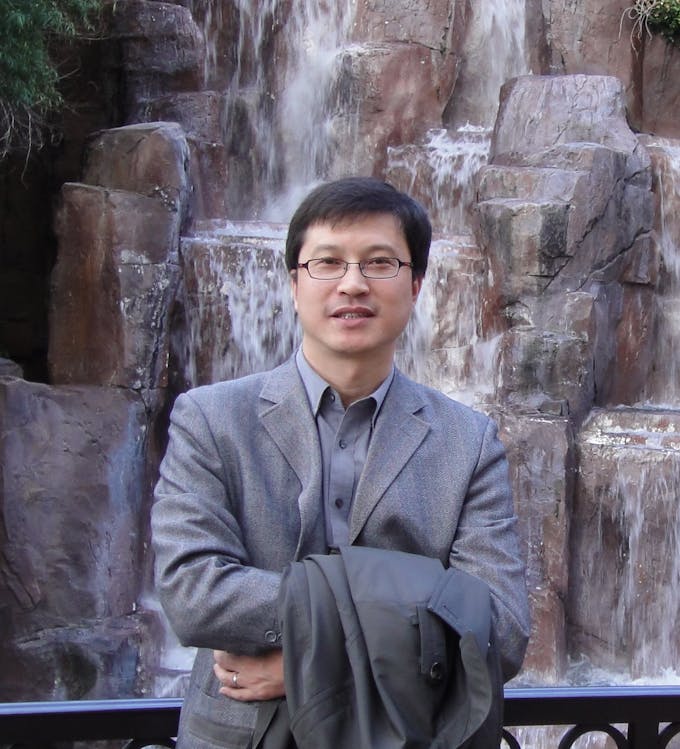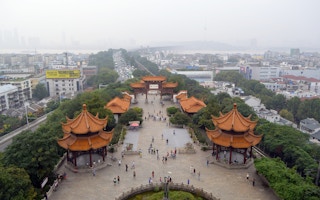In Shanghai’s Lingang district, wide streets are being built with permeable pavements so that rainwater can seep into the soil underneath them. With the district’s parks mostly constructed above street level and unsuitable for rain gardens, the government is also looking to increase rooftop vegetation and water tanks on top of buildings to slow the flow of rainwater, prevent floods and collect more of the water for reuse.
About 630km away, the city of Wuhan is taking a slightly different approach to achieve the same goals. With decades of rapid urbanisation having decimated the number of natural lakes that remain in the city, and a relatively high water table limiting the amount of water that can penetrate the ground, the government is focusing more on artificial ponds, grass swales and rain gardens to retain rainwater.
Since 2015, China has designated 30 cities as “sponge cities” with an eye to beefing up their ability to soak up rainwater and mitigate flooding due to climate change. Under the national programme, these cities must ensure that at least 20 per cent of their urban land includes sponge features like green roofs, tanks and swales by 2020, with the target rising to 80 per cent by 2030.
China’s experiences may be useful for other countries and cities, especially as it progresses on its international infrastructural project, the Belt and Road initiative, said Professor Guan Yuntao, director of the Research Centre for Environmental Engineering and Management, Graduate School at Shenzhen, Tsinghua University.
“As we built sponge cities in Shenzhen, Beijing, Shanghai, Wuhan and other places, we tailored our approach to the areas’ characteristics and overcame technical and management difficulties,” said Guan, who specialises in sponge cities and wastewater management. “With those lessons, we could help some of the Belt and Road countries to develop more environmentally friendly cities and avoid the pollution of their water bodies.”
Building an ecological civilisation
Later this month, Guan will be sharing his research on wastewater treatment and the protection of water bodies at the annual Macao International Environmental Co-operation Forum & Exhibition (MIECF) hosted by the Macao government. The event will take place at the Venetian Macao from March 28 to 30.
Guan said that events such as MIECF will help countries and cities to learn from one another’s successes. “Having this particular meeting in Macao is especially appropriate as it is a place where East meets West. The event will be a good platform for international information exchange,” he said.
He added: “China has been pushing for the construction of an ecological civilisation, and elevating the idea of ecological progress to such an important level by having this meeting shows its commitment to the matter. I think MIECF is not only a very good and apt way to propagate this goal within China and beyond its shores, but also to help everyone get support from all corners of the world to achieve it.”

Professor Guan Yuntao, director of the Research Centre for Environmental Engineering and Management, Graduate School at Shenzhen, Tsinghua University, will speak at this year’s MIECF.
Over the years, Guan has pioneered techniques such as the vacuum sewage interception pipeline and combined sewage overflow cleansing to treat dirty waterways and keep them clean.
He explained: “A lot of highways and main thoroughfares may run through natural reserves or other ecologically important areas. If a major traffic accident such as an oil spill occurs and it rains, the rainwater will help the oil to enter the surrounding land and pollute it. This is why we may want to install treatment pools and rapid treatment systems along such roads. Rainwater on roads can result in serious pollution.”
He added that more cities are beginning to strive for both economic advancement and environmental protection and restoration. “When you’re at the start of your economic journey, it may be tempting to ignore the potential environmental cost of development, but that would be a mistake. We need to ensure that the environment is protected or even improved even as we try to avoid economic stagnation,” he said.
Referring to the theme for this year’s MIECF, he said: “This will really test the wisdom and limits of our leaders and their management styles, but it is crucial for ‘[Promoting] ecological civilization and green development’.”
This year’s MIECF features Professor Guan Yuntao and other experts as speakers. To hear more from them, register for the Macao International Environmental Co-operation Forum & Exhibition (MIECF) held from March 28 to 30 at the Venetian Macao.
With an exciting line-up of an international conference, exhibition, business matching and networking activities, 2019MIECF offers access to opportunities from the Pan-Pearl River Delta Region, Greater Bay Area, “Belt and Road” area, European and Portuguese-speaking countries and beyond. At the Green Forum, speakers will discuss topics such as green finance and technologies, while the Green Showcase will feature innovative services, products and technologies for the construction and other industries.












